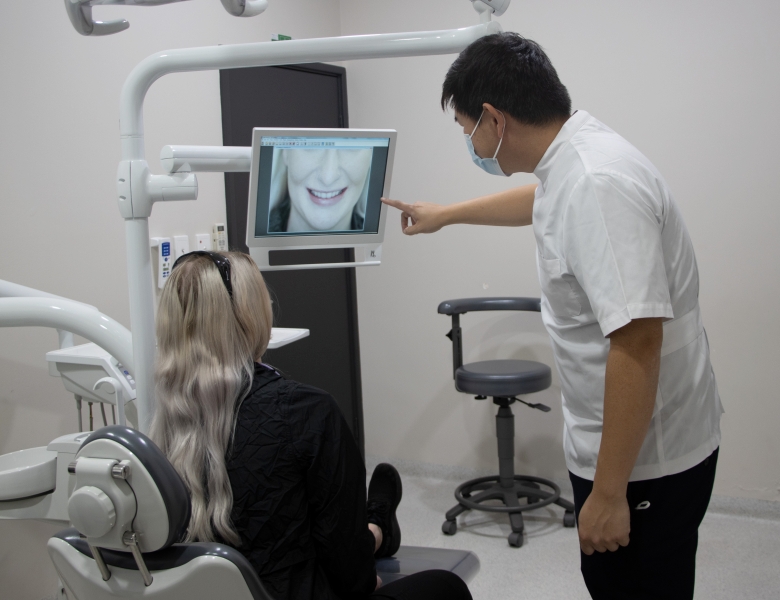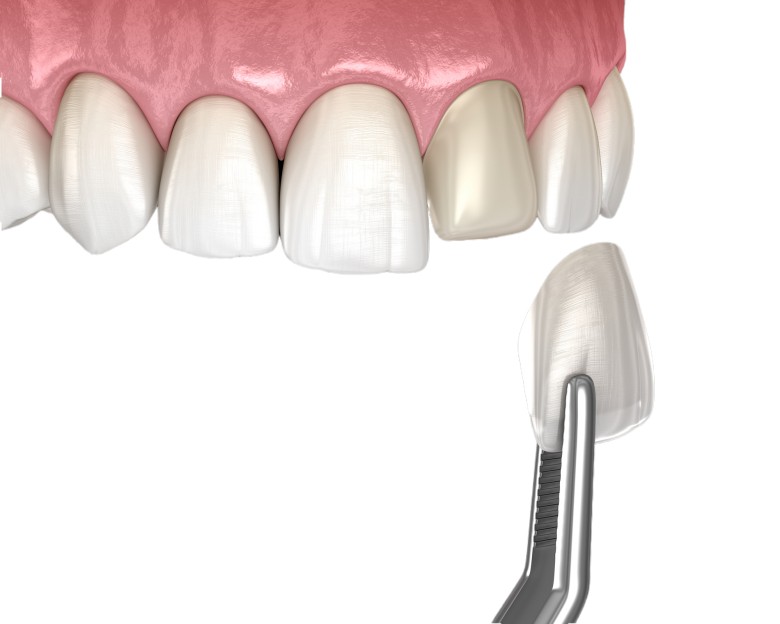
Dental Veneers
A dental veneer is a thin shell of strong, tooth-coloured material bonded to a tooth’s front surface to improve its appearance and longevity..
Dental veneers are designed to improve the appearance of teeth by correcting imperfections such as:
- Stained or discoloured teeth
- Chipped teeth
- Cracked teeth
- Gaps between teeth
Types of dental veneers
Dental veneers are typically made from porcelain, ceramic, or composite resin materials and are carefully crafted to match the look of natural teeth. They can be made specifically to change the colour or shape of your teeth to improve your overall smile.
Porcelain veneers are the most renowned for their natural tooth appearance, strength, and resistance to staining.

The process
- Your dentist will assess your oral health and determine if you are a suitable candidate for veneers. They will then prepare your teeth by removing a small amount of enamel to ensure proper placement and bonding of the veneer.
- Impressions or digital scans will be taken to create custom-made veneers that fit perfectly over your teeth. While waiting for the permanent veneers to be made in a dental laboratory, temporary veneers may be placed.
- The final step involves bonding the veneers onto your teeth using a special adhesive. Your dentist will make any necessary adjustments for fit and comfort before polishing them for a natural-looking finish.
Caring for dental veneers
By following a few simple steps, you can keep your veneer looking its best and avoid any potential issues.
Gentle Brushing
First and foremost, practicing good oral hygiene is crucial. Using a soft toothbrush to brush your teeth twice a day is highly recommended. Brush gently around the area of the veneer, using small circular motions to clean thoroughly without applying excessive pressure.
Flossing
Flossing is equally important . Use a gentle sawing motion to slide the floss between your teeth, being cautious not to snap it against the veneer. Regular flossing helps remove plaque buildup and prevents gum disease.
Avoid Hard Objects
Avoid biting or chewing on hard objects such as ice, pens, or fingernails as this can damage your dental veneer. Additionally, refrain from using your teeth as tools to open packages or bottles.
Reduce Staining Agents
Things like coffee, tea, red wine, and tobacco can discolor and stain both natural teeth and dental veneers. While porcelain veneers are resistant to staining compared to natural enamel, it’s still advisable to minimise consumption of these things or rinse your mouth with water after consuming them.
Dental Checkups
Regular dental checkups are important in maintaining the health of your dental veneers. Your dentist will examine the condition of the veneers during routine check-ups and cleanings while addressing any concerns you may have.
By following these simple care instructions and maintaining good oral hygiene practices, you can ensure that your dental veneers stay beautiful and functional for years to come.
How long dental veneers last for
They can last anywhere from 15 to 20 years with proper care and maintenance. Their longevity depends on factors such as the quality of the materials used, the skill of the dentist, and how well patients maintain their oral hygiene.
Regular dental checkups and gentle dental care practices, such as avoiding excessive force when biting into hard objects, can help extend the lifespan of veneers.
We’re here to help
If you have concerns about the appearance of your teeth, we can help determine if dental veneers are right for you. Avon Valley Dental is your local Northam dentist.
Avon Valley Dental Centre
59 Duke Street, Northam WA 6401

For appointments, information or dental emergencies:




